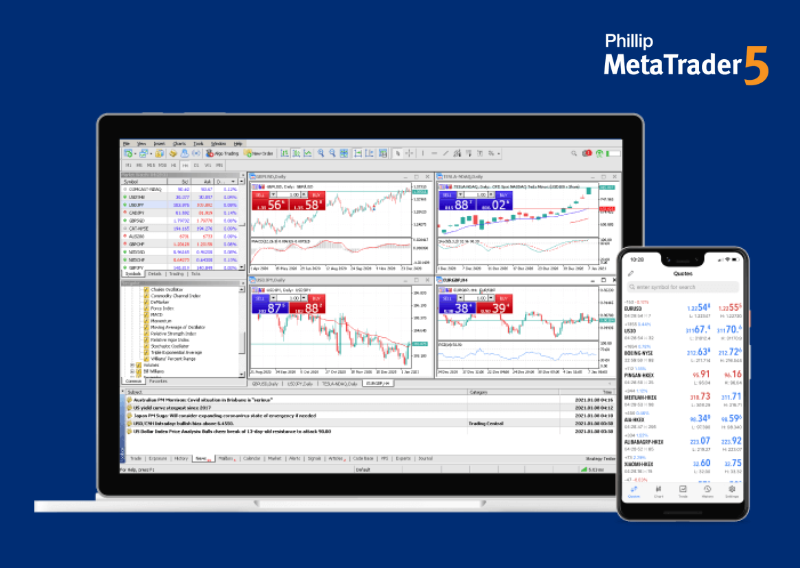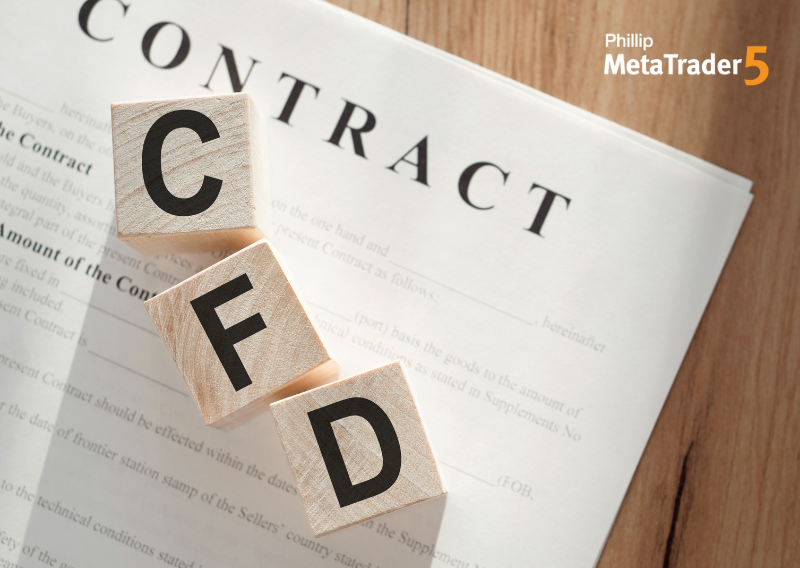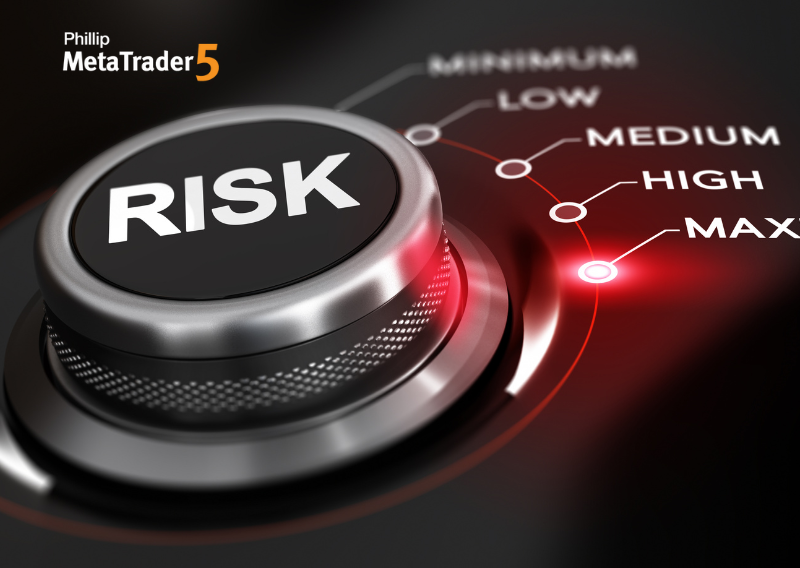介绍
Have you wondered why your profit and loss looks different from what the chart seemed to promise? Often it’s the little costs making a quiet difference. You may either pay spread, commission fee or both on every trade. A pip here, a few dollars there, trade many times and the costs will add up. Day traders feel these costs right away; swing traders feel it over weeks and months.
This guide keeps it simple and practical. We’ll:
- explain spreads and commissions in plain English
- show a quick dollar-based way to compare them
- point out when each pricing model usually works better for your size and style
And if you trade on Phillip MetaTrader 5 trading platform, you’ll see where our tight Forex spreads and zero-commission Share CFD can keep more of your edge in your pocket, so your P&L looks a lot more like what your chart promised.
What is a Spread?
The spread equals the buy (ask) price minus sell (bid) price. Because the ask price is always higher than the bid price, buying at the ask and selling at the bid makes every new trade start slightly negative by that gap.
How it shows up
For example, on a trading platform you might see:
- EURUSD = 1.10500 / 1.10506
Here:
- Bid (sell) price = 1.10500
- Ask (buy) price = 1.10506
- 传播 = 0.6 pips
If you buy 1 lot of EURUSD at 1.10506 and immediately 卖 at 1.10500, you will lose 6 US dollars. That’s your cost for opening and closing the trade.
What this means for your cost
- More liquid markets usually have smaller spreads. Start by trading those more popular products.
- Bigger size = bigger cost. The same spread costs more when you trade more lots.
What is a Commission?
A commission is the fee for placing a trade. You either pay it 实现指数 (once to open a position, once to close it) or once as a round-turn that covers both sides.
Commissions are either charged per lot (e.g., $3.5 per lot) or as a percent of trading value (e.g., 0.2% of trading value).
How it feels as a trader
- Pros: entry/exit prices can look sharp because the spread is tiny; costs are a clear line item.
- Cons: minimum commissions are always charged if trade size is below a benchmark. It makes small trades expensive.
A simple commission example
使用 US Share CFD as an example, the industry typically charges US$0.02 per share, with a minimum commission of US$10 per order (that’s US$20 per round-turn).
If you buy 10 shares of a US stock as a CFD:
- The calculated commission is US$0.02 × 10 = US$0.20,
- but because of the US$10 minimum, you still pay US$10 to open the trade.
When you later sell those same 10 shares, you pay another US$10 to close the trade.
So, on a small 10-share trade, your total commission is US$20, even though your position size is not a lot.
How Brokers Structure Trading Costs, And What It Means to You
Once you understand spreads and commissions, the next step is to look at how brokers combine them, and what that means for your actual cost per trade.
Broadly, there are two common pricing models:
- Spread-only pricing
- Spread + commission pricing
Instead of re-explaining each term, let’s focus on how these two models feel in practice.
How the cost shows up on your screen
Spread-only pricing
- You see ask and bid prices of each product
- There’s no extra cost item.
- So, once you see the chart and prices, you can know how much your cost is.
Spread + commission pricing
- The spread often looks very tight on screen.
- A separate commission is added when you open and close the trade.
- You need to calculate the commission fee plus the spread to know your total cost.
The key difference: with spread-only, you’re looking at one number. With spread + commission, you must add things up to know your real cost.
Zero Commission with Phillip Nova
At Phillip Nova, our goal is to keep trading costs clear and easy to understand:
- 在 外汇和差价合约 via 的相关, we offer spread-only accounts with tight spreads.
- There is no extra commission fee on these products – your cost is the spread you see on screen + the financing costs if you hold positions ovenight.
The following table compares the minimum spreads of major Forex pairs offered by Phillip Nova against a typical industry average:
| Phillip Nova (pips)* | Industry Average (pips) | |
| 欧元/美元 | 0.6 | 0.8 |
| 美元/日元 | 0.6 | 0.8 |
| 英镑/美元 | 0.7 | 1 |
| 美元/瑞郎 | 0.7 | 1.5 |
| 澳元/美元 | 0.6 | 0.6 |
| 纽元/美元 | 0.9 | 1.4 |
| 美元/加元 | 0.9 | 1.3 |
| 欧元/澳元 | 1.1 | 2.4 |
| 英镑/日元 | 0.9 | 2.1 |
*最低点差仅供参考,实际点差取决于当时的市场状况。
Across major and minor pairs, Phillip Nova’s minimum spread is competitive against other platforms, helping to keep your day-to-day trading costs low.
Small vs Large Trades: What the Numbers Show
In real life, the “better” model often comes down to how big you trade.
Let’s use US Share CFD to illustrate the difference between:
- a typical commission-based account (around US$10 per order, 或者 US$20 per round-turn), and
- Phillip Nova’s spread-only Share CFD pricing (no commission per ticket).
In the wider industry, US Share CFD often come with those fixed minimum commissions per trade. By contrast, on Phillip MetaTrader 5 trading platform, Phillip Nova charges 零佣金 for Share CFD and recovers costs via the spread, which typically ranges from about 0.02% to 0.06% of the stock’s mid-price per round-turn.
As the table below shows, for 10-share US Share CFD trades, Phillip Nova’s spread-only, zero-commission pricing can be many times cheaper than a standard fixed commission fee.
| 美国股票 | 10 Shares | ||
| Notional Value | Phillip Nova | Commission Account | |
| TESLA | $ 3,346 | $ 1.2 | $ 20.0 |
| MICROSOFT | $ 5,068 | $ 1.2 | $ 20.0 |
| PALANTIR | $ 1,550 | $ 0.9 | $ 20.0 |
| $ 7,492 | $ 2.7 | $ 20.0 | |
| AMAZON | $ 2,340 | $ 0.9 | $ 20.0 |
| APPLE | $ 2,379 | $ 0.9 | $ 20.0 |
| MICRONTECH | $ 1,210 | $ 0.7 | $ 20.0 |
| AMD | $ 1,602 | $ 0.9 | $ 20.0 |
| $ 2,281 | $ 1.0 | $ 20.0 | |
| NVIDIA | $ 1,707 | $ 0.9 | $ 20.0 |
Now scale up to 100 shares, where trade values sit over US$10,000, Phillip Nova’s spread-only cost for most stocks remain cheaper than the minimum commission fee.
| 美国股票 | 100 Shares | ||
| Notional Value | Phillip Nova | Commission Account | |
| TESLA | $ 33,457 | $ 12.0 | $ 20.0 |
| MICROSOFT | $ 50,683 | $ 12.0 | $ 20.0 |
| PALANTIR | $ 15,498 | $ 9.0 | $ 20.0 |
| $ 74,922 | $ 27.0 | $ 20.0 | |
| AMAZON | $ 23,395 | $ 8.8 | $ 20.0 |
| APPLE | $ 23,792 | $ 8.6 | $ 20.0 |
| MICRONTECH | $ 12,102 | $ 7.4 | $ 20.0 |
| AMD | $ 16,018 | $ 9.4 | $ 20.0 |
| $ 22,806 | $ 10.0 | $ 20.0 | |
| NVIDIA | $ 17,068 | $ 9.0 | $ 20.0 |
Commission-based pricing only really pulls ahead when you trade very large tickets, such as hundreds of shares per order, where notional values move into tens of thousands to a few hundred thousand US dollars per order and the spread costs can exceed the commission fee.
Why Phillip Nova’s Spread-Only Model Often Wins
Most traders don’t trade huge tickets at once but do trade fairly often.
If you like to scale in and out, take partial profits, or adjust positions along the way, a commission on every order can add up quickly. Even if you are not daily trader, a fixed fee per order still takes a noticeable bite out of your positions.
This is where our pricing structure is designed to help:
- 在 现货外汇, we use a spread-only model, there’s no extra commission layered on top of your trades.
- 在 股票差价合约, we go further with 零佣金, so you don’t pay a ticket fee when you trade short-term moves in global stocks.
Conclusion
The real cost of trading isn’t just what you see on the chart, it’s the spread plus any commission and minimum fees.
If you remember only three things, let it be these:
- Both spreads and commissions add up over many trades.
- Fixed minimum commissions hurt frequent trades the most.
- Spread-only, zero-commission pricing is often kinder to active, everyday traders.
That’s why Phillip Nova offers 零佣金 和 tight-spread Forex 和 股票差价合约 在 的相关. Your main cost is the spread you see on screen.
Next step:
Try a Phillip MetaTrader 5 demo account, test how costs look on your usual trade sizes, and when you’re ready, open a live account.












